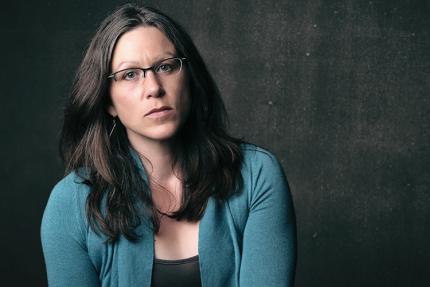CRC Member Writes a Story of 'Death, Drugs, and Forgiveness'

Amy Scheer
Kevin Jansma was at home in 2004 with his infant son, Trey, when a policeman arrived at his door, holding a piece of paper that read “severe head trauma.”
In a new book called Frames: a picture of death, drugs and forgiveness by author Amy Scheer, Jansma says he was able to read that piece of paper more quickly than the police officer could speak.
Looking at the words, he said, he had an overwhelming feeling that his wife, Marilyn, who had been driving to visit a college roommate in Chicago, had died. Her car had been hit in a terrible accident caused by a man who had fallen asleep at the wheel.
But at that point, when the police officer showed up, it wasn’t clear what had happened or how Marilyn was doing.
“They said to call this number, call the hospital right away,” recalled Jansma, who was executive pastor of Prairie Ridge Church, a large Reformed Church in America congregation in Ankeny, Iowa, at the time.
When he called the hospital, Jansma was told she hadn’t arrived yet, but the helicopter was landing.
As Jansma waited anxiously, friends started to gather at his house. Meanwhile, calls went back and forth, giving him updates, until he finally heard from the doctor who said, “We’re terribly sorry; she has died.”
Told in the words of the people involved in this story, the book is as much a poetic reflection, published with lots of white space between phrases and even entire pages, as it is an account of how the death affected the Jansma family.
“I wanted to tell the story in Kevin’s words. They were his gift to me,” said Scheer, a journalist who also works in theater and is a member of Church of the Servant CRC in Grand Rapids, Mich.
“I used the white space as a way for readers to pause and meditate, if they want, on what happened. For example, except for two short phrases from the Lord’s Prayer, there are four blank pages after Kevin learns his wife had died.”
A powerful aspect of this story — and one that drew Scheer to telling it — was how Jansma was able to forgive Rick, the driver who had caused the accident.
In an acknowledgment at the end of the book, Scheer says she was originally asked in 2007 to write a short article about Jansma and the accident for the alumni magazine of Northwestern College in Orange City, Iowa. Jansma is an alumnus of Northwestern.
Scheer says she has two memories of that time. First, she had started another job and didn’t think she would have adequate time to do the story. Second, during the interview, Jansma mentioned almost in passing that he had met with and had forgiven Rick.
It was, she writes, “as if forgiving the man who killed your wife was no big thing. He almost didn’t want to talk about it.”
But after hearing how he had been willing to meet and reconcile with Rick, Scheer wanted to follow up on this development. Jansma agreed, and they spent hours together.
Along with gathering Jansma’s story, Scheer also interviewed Rick, an auto mechanic, in the Chicago garage where he works.
Rick told her that he had spent the night before the crash drinking heavily and doing drugs with his friends. Even though he had been able to grab a few hours of sleep, he said he was still really disoriented when he caused the accident on the Chicago tollway. In the book, he recounts the aftermath of the accident:
“I woke up. I was completely confused. I actually tried putting the air bags back, folding them up, and starting the car. I thought of the weed in the glove box and put it in my pockets.”
He goes on to say: “Then I was yelling at the fireman, or whoever he was, because my shoes fell off, and they pulled me out. I fell back asleep again. I woke again. I was in the ambulance.”
Rick, who was put under house arrest and spent time in jail on the weekends, said he will never forget the accident — “and neither will Kevin. . . .There’s all kinds of reminders. Everything makes me think of it.”
Besides interviewing Jansma and Rick, Scheer had the opportunity to read Marilyn’s journals, view a DVD of the funeral, and talk with and use emails from Kelley Van Haaften, who later married Kevin Jansma.
At no point in the book does she as the writer intrude, she said, because “it was almost a moral thing. I didn’t want to get in the way of this story at all . . . . That way you can do with the story as you want.”
The title Frames reflects the structure of the book — “a collection of snapshots from the story — and refers to a scene recounted in the book, where Kevin's mother is distressed over what to do with his first wedding photo after he remarries,” said Scheer.
“Mom,” he tells her in the book, “I'm really proud of the marriage I had with Marilyn. And I'm proud of the relationship I have with Kelly just as much. It's okay if you want to leave it up. Just don't put one in front of the other.”
“It's a nice symbol of what to do with what life hands us, I think,” said Scheer.

